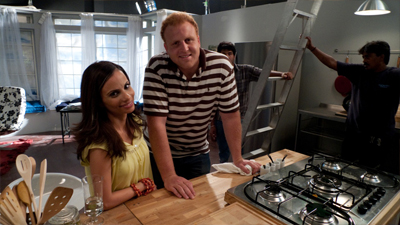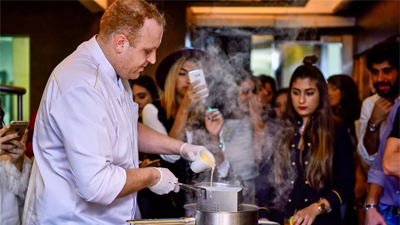Under the Chef’s Hat: An Interview with Fatafeat’s Andrew Mitchell

Nadine El Shiaty
TV presenter and home-cooking guru by day, experimental foodie by night, Chef Andrew Mitchell has had quite the career. He stands as one of the most recognisable faces when it comes to food in Egypt and the Middle East; but only to him, nothing beats the good old bowl of mac and cheese infused with orange cheddar cheese, cream, butter, some salt and pepper, his all-time favorite dish.
We sat down with the Canadian-Egyptian Fatafeat star, who told us about his upbringing and culinary journey – one that took-off in Australia and has taken him to many corners of the world.
The Beginning of the Beginning
Born and raised in Canada, Mitchell only came to realise that he was Egyptian at the age of 7, when confronted with a school project that required pupils to showcase their origins.
“I had made something using cardboard with the pyramids and the Sphinx glued to it. It was actually the first time it clicked to me that my parents weren’t from Canada and that I was Egyptian,” Mitchell said.
After finishing school in Canada, Mitchell came back to Egypt where he earned his high school degree from Cairo American College (CAC). But with limited opportunities in Cairo for an aspiring chef, Mitchell went back to Canada where he studied Culinary Arts at Liaison College and earned his apprenticeship at York College.
Mitchell Meets Mustard
At the age of 21, Mitchell moved to Australia where he got a job offer at a local restaurant in a particularly touristic area; only he didn’t find the learning experience quite fulfilling. It was only when he moved to Perth in Western Australia that Mitchell’s real journey began – specifically as he observed chefs walking out of the Subiaco Oval Stadium.
“I was wondering why they were chefs walking out of a football stadium. It turns out that this was where Mustard Catering exists, a global catering service which handled everything from the Sydney Olympics and the Rugby World Cup, to the conventions and corporate events,” he said.
Eager to land a job at Mustard Catering, Mitchell walked into the Executive chef’s office and presented his CV.
“His name was Malcolm Lyon. He threw my papers on the ground and said that they mean nothing. We’re going to throw you in the deep end and you’ll either sink or swim.”
Mitchell started the next day at 7AM sharp and ended up working for the company for around 18 months until Lyon retired – which set Mitchell on the next part of his journey. “I had nothing else at the place to learn because my mentor had gone.”
To Mitchell, working at a premium top-notch catering service like Mustard Catering gave an edge to his career and even cites the position as the place he actually learned most of the things he knows today.
Mitchell’s culinary journey took him to Bali next, where he worked as a chef at a restaurant – something that was cut short following an unfortunate motorcycle accident and a move to France to embark on the healing process.
“I decided to spend the year in France, going to random restaurants, and trying the food. If I liked it, and if the chef was cool, I’d work for free for a week or two just to get experience. I kept doing that over and over for a year until I depleted all of my savings,” Mitchell laughed, adding that for him, it was time to look for another opportunity and come back to Egypt.
Fatafeat
Coming back to Egypt, Mitchell worked as a chef at one of the country’s top hotels for a period, only to decide that it was about time he started doing something on his own. After settling in Cairo, Mitchell became part of the team launching Seasons Country Club, becoming the Executive Chef and impressing diners at the country club’s Alto’s Bistro until the revolution erupted.
“This was the opportunity that gave me my real start in Egypt; it’s what at the time attracted the Managing Director of Fatafeat, who offered me my own show almost five minutes after meeting me,” said Mitchell, who came to be known as Chef Andrew, the renowned Egyptian-Canadian Chef, hosting Shurba w Na2na2a (Soups and Snacks), a popular cooking show on Fatafeat.

Cooking for Restaurants vs Cooking for TV
According to Mitchell, being a television personality is as much a lifestyle as a job, which, just as many other things, also has its ups and downs.
“In restaurants, you’re focused on the products that leave your hands and goes to the guests’ tables, whereas on TV, you’re trying to show people how to do something. You put yourself in the shoes of the person watching and think about how best to communicate the steps, etc. It’s easy to tell a chef to add this to that because you use plenty of terminologies, but on TV, it’s not that simple,” explains Mitchell, who, in recalling his first TV experiences, told us that after the camera would start rolling, the director would often stop him and tell him that he doesn’t understand what he means.
“I learned quickly that I needed to change how to run things. I needed to think of the average housewife in Arab countries,” added Mitchell, who also admits to being humbled by fans who, not only come and say hello, but also thank him for recipes he’d taught them or how he encouraged and inspired them to do something they’d never done.
Perhaps one of the fundamental things which stuck in Mitchell’s mind and stayed with him while coming up with recipes for Fatafeat, was something that the channel’s Managing Director, Youssef El Dib, told him.
“He told me that I need to be the average housewife’s hero; the kind who can’t go eat out all the time but wants to be taught how to achieve the same food home.”
Building up on that idea, Mitchell’s core aim became coming up with recipes that are healthier, executed with local, quality products.
“Let’s say you have a burrito with beans, cheese, jalapeños and peppers. A burrito is flower bread; so instead of the tortilla shell, people now have the resources to make their own or use something like the shami bread. If you find imported refried beans like Al Paso, you’re going to pay 50LE for something that’s Mexican foul at the end of the day. You can simply use foul and by adding certain local spices like cumin and garlic, you can end up with a better product that’s cheaper, healthier and tastier,” said Mitchell, adding that the key is to find what’s convenient for you.
Using El Dib’s advice as a pillar, Mitchell came up with over 1,000 recipes for his show; in his own mind, though, he became the guy who simplified things for the audience, which pushed him into tapping into more challenging cooking for his audience.
“I’ve been smoking hunks of meat at home and oven-drying my own tomatoes, because I am trying to show people that they have the time for these things. So, instead of the five-minute meals, I’m trying stuff that takes a day to cook – but they’re so worth it because you wouldn’t be able to get it anywhere else.”
Kitchen Nightmares
Becoming a chef sometimes means you come across the best, the strangest and the worst culinary mishaps.
Sharing an anecdote from when he was neck-deep in his apprenticeship, Mitchell and his team of young chefs had to serve soup for 400 people and by the time the soup had to be served, it wasn’t thick enough.
“My chef got me 10 loaves of white bread and told me to hollow out the white parts of the bread. We used them to thicken the soup and it worked,” Mitchell said.
Pushing him to reveal any secret ingredients that he likes to use, Mitchell cites Montreal steak spice – a Canadian spice mixture which he learned to make himself – as a favourite, but insists that technique is what makes all the difference.
“I believe the secret things are mostly tricks, rather than ingredients. Adding curry or cumin to something is one thing, but toasting the ingredients or freeze-drying the fruits is usually what makes the difference,” he said.
Mitchell’s career has been littered with funny anecdotes, but possibly the most amusing came during time spent on an oil rig, where the chef in charge told one of the staff that he was cooking for 200 men – meaning that he had to defrost at least 100 chickens.
“The guy disappeared for an hour and then suddenly someone came yelling. Apparently someone had turned on the clothes dryers and there was a tumbling noise and sparks shooting out. The guy had decided to defrost the chicken in the dryers,” Mitchell told us, adding that he messed up the chickens, the dryers and that because they were on an oil rig, they had to helicopter some equipment.
“Imagine 200 cranky oil rig workers not being able to do their laundry for a few days – it was the funniest kitchen screw-up I’ve seen in my life,” Mitchell laughed.
Mitchell: Jamie Oliver is ‘Pukka’
If there was ever any doubt that Mitchell believes that being a chef is indeed a lifestyle, you needn’t look further than the man he happily refers to as his biggest inspiration: Jamie Oliver.
To him, it’s not just about Oliver’s recipes or his generally amiable personality; it’s about his whole success story and the fact that he’s made such an impact on the chefs’ community in the UK, working with ex-cons and turning them into career chefs, not to mention his efforts to bring healthy food to schools.
“There’s something admirable about the simplicity of his production. Jamie cooks from his house, where there’s only one guy with a camera and his wife directing from the back. It all feels so down to earth and it makes you feel very comfortable. He’ll always be an inspiration to me,” Mitchell said, adding that he’s also grateful and proud to have been brought up in a home that loves and appreciates food.
“When I was a kid, convincing my parents of buying me a $100 Nike Air Max was near impossible; but ask them to take me to a certain restaurant and they’d take me the same night – no matter what the cost was. Food has always been a priority in my house. We always have amazing food and endless love,” said Mitchell who says with complete confidence that his parents, though not professional chefs, cook better than 90% of the chefs he has come by.
What’s Next for Chef Mitchell?

Mitchell has had quite the journey thus far, but it’s far from over. He aspires to establish a chef school in Egypt, a cooking community centre where people who love food can come to learn how to plant certain herbs at home and how to shop for products at grocery stores, as well as a production kitchen where brands can activate new food products and new tools entering the market.
“There are much more interesting and far more rewarding things you can do in this industry than opening a new restaurant.”
recommended
 Restaurants
Restaurants
Cairo's Ramen Revival: 5 Must-Try Bowls Around the City
Asian Food Asian Restaurants Cafés
Cafés



